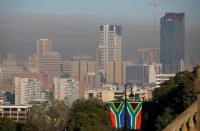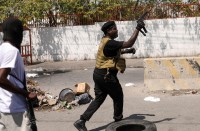As its protest of sincerity, Kenya has burned 105 tons of ivories on Saturday for the largest scale of ivory destruction in African history. The burned ivories are worth about 100 million U.S. dollars.
The Kenyan president, Uhuru Kenyatta, has done the lighting in person to further emphasize the sincere determination of the nation in its fight against elephant poaching.
Of the 450,000 to 500,000 heads of elephants now roaming the African continent, more than 30,000 heads are killed each and every year for various reasons, mostly for their tusks or ivories as they are known in the now internationally-banned ivory trade.
The Kenyan government aspires to use Saturday’s ivory burning as its sincere statement on saving the mammals from human poachers.
“There is [are] a lot of conflicts between the elephants and the community, in different regions, especially the rural areas, which has a high population of elephants. Because of this reason, the community members have been building high conflicts, because the elephants damage the crop; they injured people, and unfortunately kill human beings as well. So this has been a big problem for conservationists, because we would like human beings and elephants to coexist in a simple manner. But because of the conflict, huge numbers of elephants have been killed,” says Catherine, member of the Nairobi-based Africa Network for Animal Welfare.
But for-profit poaching is a much bigger threat to elephant survivals than the human-elephant conflict over crops.
“So the second problem is poaching. As you know, it’s a big problem for community even in all parts of Kenya and Africa at large. We have people killing the animals for ivory, and also other animal as well, but specifically elephants: they are decimated in huge number,” says Catherine.
According to the Kenyan Wildlife Service, poachers have to kill at least 8,000 heads of elephants to collect the ivories burned on Saturday. The Kenyan authorities have also burned 343 horns of rhinoceroses or rhinos for short.
“As you know for a long time Kenya as a country has been against ivory trade, which is one of the biggest crimes in the world. So burning the ivory will be a big significant statement as a country to say that we are against ivory trade, and then this practice should end. We are against poaching; we are against the conflicts among human and animals. So it’s a big statement to declare that we value our wildlife as an organization, as an individual and as a country as a whole,” says Catherine.








